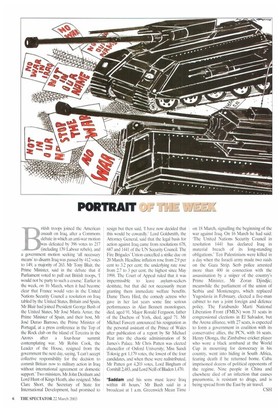PORTRAIT
ritish troops joined the American assault on Iraq, after a Commons debate in which an anti-war motion as defeated by 396 votes to 217 i (including 139 Labour rebels), and a government motion seeking 'all necessary means' to disarm Iraq was passed by 412 votes to 149, a majority of 263. Mr Tony Blair, the Prime Minister, said in the debate that if Parliament voted to pull out British troops, 'I would not be party to such a course.' Earlier in the week, on 16 March, when it had become clear that France would veto in the United Nations Security Council a resolution on Iraq tabled by the United States, Britain and Spain, Mr Blair had joined President George Bush of the United States, Mr Jose Maria Aznar, the Prime Minister of Spain, and their host, Mr Jose Durao Barroso, the Prime Minister of Portugal, at a press conference in the Top of the Rock club on the island of Terceira in the Azores after a four-hour summit contemplating war. Mr Robin Cook, the Leader of the House, resigned from the government the next day, saying, 'I can't accept collective responsibility for the decision to commit Britain now to military action in Iraq without international agreement or domestic support.' Two ministers, Mr John Denham and Lord Hunt of Kings Heath, also resigned. Miss Clare Short, the Secretary of State for International Development, had promised to resign but then said, 'I have now decided that this would be cowardly.' Lord Goldsmith, the Attorney General, said that the legal basis for action against Iraq came from resolutions 678, 687 and 1441 of the UN Security Council. The Fire Brigades' Union cancelled a strike due on 20 March. Headline inflation rose from 2.9 per cent to 3.2 per cent: the underlying rate rose from 2.7 to 3 per cent, the highest since May 1998. The Court of Appeal ruled that it was impermissible to leave asylum-seekers destitute, but that did not necessarily mean granting them immediate welfare benefits. Dame Thora Hird, the comedy actress who gave in her last years some fine serious performances in Alan Bennett monologues, died, aged 91. Major Ronald Ferguson. father of the Duchess of York, died, aged 71. Mr Michael Fawcett announced his resignation as the personal assistant of the Prince of Wales after publication of a report by Sir Michael Peat into the chaotic administration of St James's Palace. Mr Chris Patten was elected chancellor of Oxford University; Miss Sandi Toksvig got 1,179 votes, the lowest of the four candidates, and when these were redistributed, Mr Patten got 4,203 votes, Lord Bingham of Cornhill 2,483, and Lord Neill of Bladen 1,470.
'Saddam and his sons must leave Iraq within 48 hours,' Mr Bush said in a broadcast at 1 a.m. Greenwich Mean Time
on 18 March, signalling the beginning of the war against Iraq. On 16 March he had said: The United Nations Security Council in resolution 1441 has declared Iraq in material breach of its long-standing obligations.' Ten Palestinians were killed in a day when the Israeli army made two raids on the Gaza Strip. Serb police arrested more than 400 in connection with the assassination by a sniper of the country's Prime Minister, Mr Zoran Djindjic; meanwhile the parliament of the union of Serbia and Montenegro, which replaced Yugoslavia in February, elected a five-man cabinet to run a joint foreign and defence policy. The Farabundo Marti National Liberation Front (FMLN) won 31 seats in congressional elections in El Salvador, but the Arena alliance, with 27 seats, is expected to form a government in coalition with its conservative allies, the PCN, with 16 seats. Henry Olonga, the Zimbabwe cricket player who wore a black armband at the World Cup in mourning for democracy in his country, went into hiding in South Africa, fearing death if he returned home. Cuba imprisoned dozens of political opponents of the regime. Nine people in China and elsewhere died of an infection that causes pneumonia, is resistant to drugs, and is being spread from the East by air travel.
CSH




































































 Previous page
Previous page